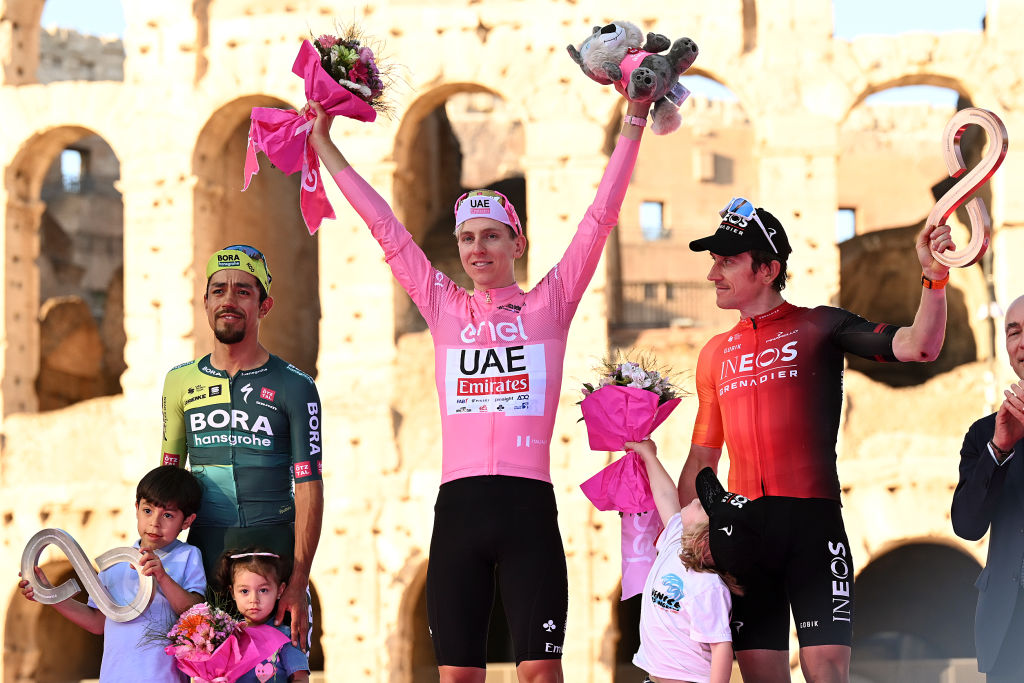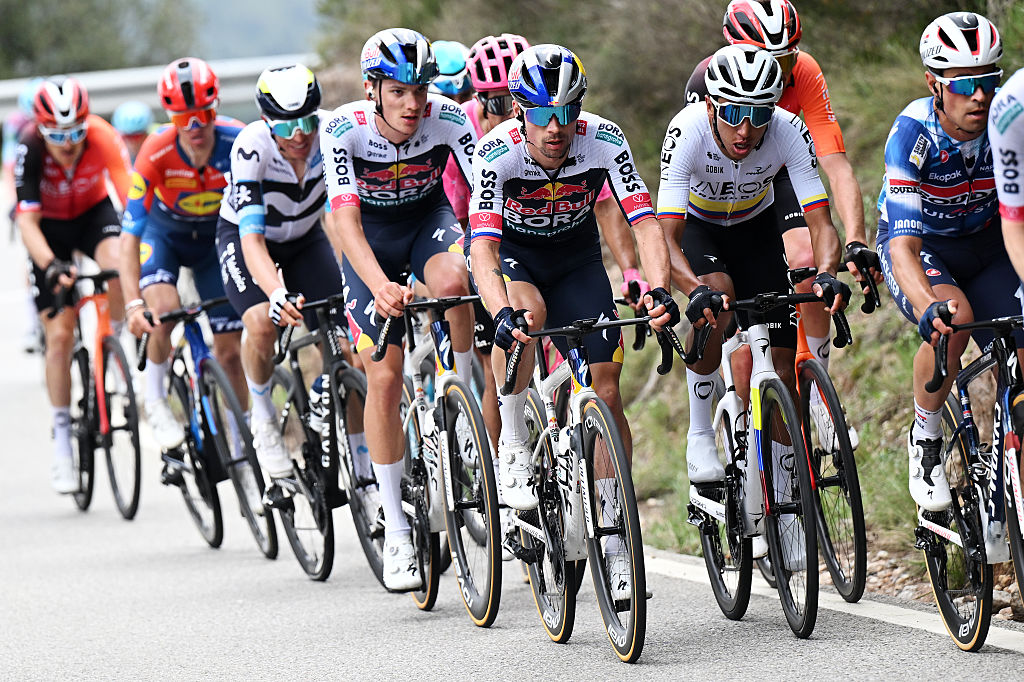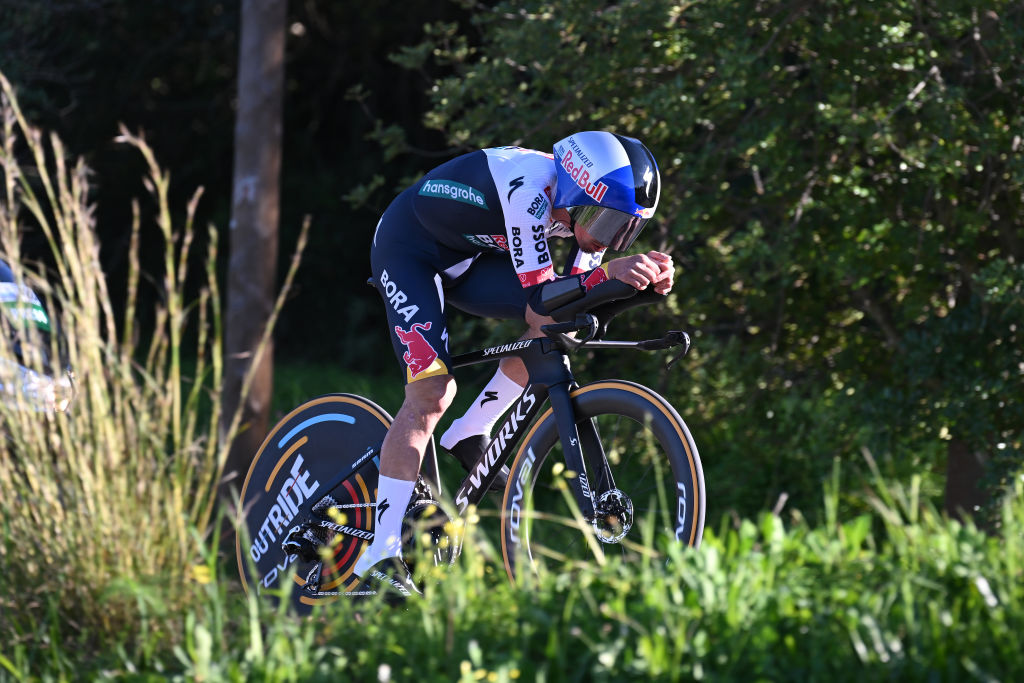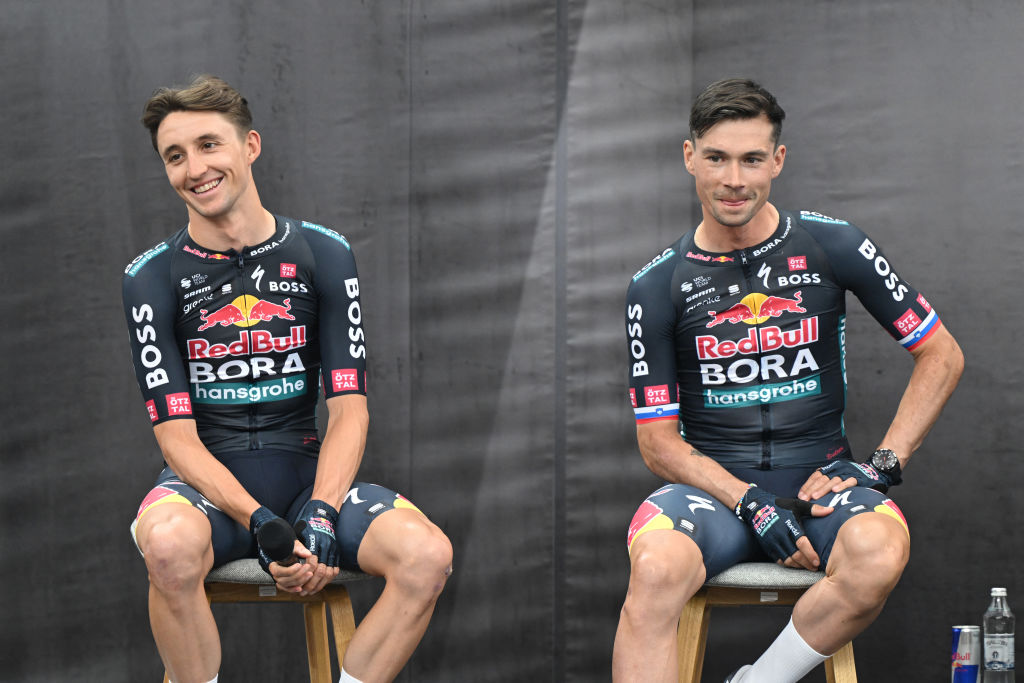A very different Giro d'Italia - How will the absence of Tadej Pogačar shape this year's race?
No Pogačar or Jonas Vingegaard makes for a wide-open, dynamic Italian Grand Tour

In the 2025 Giro d'Italia Grande Partenze host nation of Albania, for generations, people have liked to do what they call the xhiro, which is essentially a daily opportunity to gossip with neighbours, craftily disguised as an evening walk.
The 2025 Giro is only racing in Albania for three days, but in equivalent leisurely discussions during the countdown to Friday's opening stage, the hot topic – the 'xhiro about the Giro', you might say – is simple: What will this year's edition be like without the presence of Tadej Pogačar?
The short answer has to be: very different, given last year from beginning to end, Pogačar had a complete stranglehold on the Giro d'Italia, claiming six stage wins en route to the biggest winning GC margin – 9:56 – since 1965.
But having blazed such a devastating trail in his Giro debut, then opting not to go for a repeat participation in 2025, the UAE Team Emirates-XRG leader leaves a correspondingly large vacuum of power in his wake. Had the brief Giro d'Italia participation rumours about Jonas Vingegaard (Visma-Lease A Bike) proved more than winter speculation, the double Tour de France winner would have been the obvious candidate to fill the gap left in Italy by Pogačar.
But the rumours proved unfounded, and to say the absence of the two most successful stage racers of their generation leaves the 2025 Giro d'Italia much more wide open would be a massive understatement.
The number of potential candidates for victory isn't endless, but it's certainly much higher than 2024, even when you exclude Pogačar. For one thing, there are up-and-coming challengers of the calibre of the Slovenian's teammates, Juan Ayuso and Isaac del Toro or Michael Storer (Tudor) and – perhaps, given his GC ambitions are as yet unclear – Tom Pidcock (Q36.5).
But amongst the established heavyweights, quite apart from riders with tried and tested GC potential like Mikel Landa and the Yates brothers – Adam and Simon – no less than five former Giro d'Italia winners are set to clamber down their team bus stairs and head down the Giro's first startline in Vlore on Friday.
These range from Nairo Quintana (2014), Richard Carapaz (2019) to Egan Bernal (2021), Jai Hindley (2022) and the biggest favourite – but by no means the overwhelming one like Pogačar – of all: Primož Roglič (2023).
Get The Leadout Newsletter
The latest race content, interviews, features, reviews and expert buying guides, direct to your inbox!
'No Pogačar or Vingegaard – that shifts the responsibility for the race'
When it comes to such a long contenders list, you could draw parallels with the 2024 Vuelta a España, which was the only Grand Tour that season in which Pogačar did not start, either – and neither did Vingegaard.
However, as Roglič's team manager at Red Bull-Bora-Hansgrohe, Rolf Aldag, points out, the fact that the Giro always comes first in the Grand Tour calendar means more riders are racing in Italy (and Albania) at their maximum potential. On paper, at least, that should make the battle much fiercer and unpredictable than even the Vuelta a España.
"The Giro being in May makes it easier to plan, normally you've been working straight up to one event since November," Aldag told Cyclingnews. "What happens at the Vuelta is normally the consequence of something else: either it's the second Grand Tour of the year or something went wrong beforehand" – like Roglič crashing out of the 2024 Tour, say – "and you're trying to fix it.
"Then the fact there is no Pogačar or Vingegaard – that shifts the responsibility for the race, that's clear. Because it feels like whenever UAE go anywhere with Pogačar, they take responsibility because he's the number one in the world.
"So it's going to be interesting to see who's committing to what, who looks at each other and says – it's up to you to race, or to chase down a group. That helps make it all a bit more unpredictable."
Red Bull know only too well from recent experience what a topsy-turvy Grand Tour leader's battle that can emerge from a lack of clear domination by a top squad or individual can look like.

In the first week of the Vuelta last year, by getting in a surprise breakaway and then Red Bull failing (with the other GC contenders' teams) to chase it down in time, AG2R's contender Ben O'Connor was able to carve out a massive 6:30 advantage over previous race leader Roglič. The Australian then held onto Vuelta's top spot on GC that lasted nearly a fortnight and left Roglič playing a drawn-out (and entertaining for the fans, if not the team) game of catch-up.
That kind of early ambush on GC, causing major trouble for other pre-race overall candidates, is only one of several potential multiple scenarios in this year's Giro. But as Aldag says, the very fact that it could happen makes for a very different situation from last year's Giro, where Pogačar's domination more or less killed off any suspense whatsoever from the first summit finish on stage 2 at Oropa.
"It makes a little bit more uncertainty, a little bit more gambling. And a little bit less clearness who the stand-alone favourite is," Aldag says.
It's all a far cry from the upcoming Tour de France, say, where anything but a Pogacar or a Vingegaard win currently seems wildly improbable, and also - assuming at least one of the two rides - the 2025 Vuelta.
There's not just the Giro's long history of unexpected GC plotlines to bolster that argument that pretty much anything could happen, too. The 2025 Giro d'Italia route also lends itself to a rise in speculation as to who could really come to the fore and how quickly. There are plenty of opportunities for ambushes in the first two weeks, and the Giro is far more fraught with far more potential danger spots than, say, the Tour's usual opening ten days.
As Remco Evenepoel found to his cost in the 2021 Giro, stage 9's ride through the Strade Bianche of Siena, say, or the complicated, technical finales to both stage 1 to Tirana and stage 5 to Matera all have the potential to catch out the unwary and/or under-prepared.
Yet even if there is a first-category finish at stage 7 at Tagliacozzo, it's also true that in the first half of the 2025 Giro, there is no major set-piece mountain battle we've seen in other editions: there's no Etna in the south or the Gran Sasso or Blockhaus in the Apennines.
Rather, barring the stage 10 time trial, if it's easy to see where a GC contender or two could drop off the radar, for the majority there's likely a temptation to play a waiting game until the third week, which in terms of vertical climbing at least, has four of the five hardest mountain stages. But as Aldag says, that strategy carries its own risks, too.
"I wouldn't underestimate the Albania stages, from what we know so far, they're far from easy," Aldag warns. "But yes, we're back to that old phrase about the usual first week scenario of – you can't win the Giro, but you can lose it.
"Certainly you can't take the traditional approach of, say, the Tour de France, where it's ok for a GC rider to have 95% of their top shape in the first week because it's only Normandy or Brittany and it's all flat. If you tried that in the Giro, you might have a pretty bad wake-up call.
"You're not going to win the Giro in this first week. But it can be very interesting to see who is really sharp at the start and who needs more work to get the ball rolling."
From Albania to Finestre

While there's no knowing whether Albania's opening hilly stages will actually see GC action – there's a case for saying both could end up being large bunch sprints – the question of GC 'readiness' will definitely be important on stage 2's 13.7km time trial. ('Everyone will have their own time, so it's a GC day, ' as Roglič told Cyclingnews.)
That kind of distance is not long enough to create any kind of major differences, and there's no Remco Evenepoel present, either, to open up a gap of 20 seconds on all his rivals as he did on a similar distance on the stage 1 time trial in Ortona back in 2023.
However, as we saw in the early Giro time trial in 2022, as well, in Hungary, the stage could yet see some interesting time gaps emerge, and Roglič, who's only ridden one time trial this year back in the Volta ao Algarve, will come in for special attention.
As Roglič told Cyclingnews when asked about it last week, he has not dedicated special attention to his time trialling training, and in fact, his last victory of a total of 19 time trials to date – three in the Giro d'Italia, including the crucial final race against the clock in 2023 on the slopes of Monte Lussari – was in the 2024 Itzulia Basque Country, over a year ago.
"Every TT needs full focus and everybody's kind of happy that this early TT isn't one where it's decided that they'll make it 65km long and then they [the organisation] are surprised that a lot of the GC interest is gone," Aldag says when asked about Roglič's options and possible vulnerability – given the lack of 'live TT work this spring – this weekend in Tirana.
"Engineering the course is always a big challenge for the organisers, to try and create a clear hierarchy but not pre-decide the race, and I think they've done a good job this time round. We'll get time gaps on Saturday, for sure. But not massive ones."
At the opposite end of the 2025 Giro's challenges comes the Colle delle Finestre, the toughest climb in what is by far the hardest stage of the entire race, and the last major challenge, too, prior to the largely ceremonial final run through Rome on June 1. However, Aldag does not agree that – as has happened in Giros like in 2022 and in 2023 – that, as a result of such a daunting test at the finale, the GC riders may play it overly conservative in the long build-up beforehand.
"I think there are enough really interesting stages before, and there's always a risk if you do wait, because that way there's only going to be one winner," Aldag said. "I think favourites will test each other sooner, and you have to be flexible enough to say that if you see a certain weakness in a competitor, or if they have a problem with the weather, say, then you have to make use of it.
"Every Grand Tour, in any case, has its own special scenario, and you have to be flexible, not just stick with particular predictions. Waiting for the end, though, will only work out for one rider, so I think it's unlikely."
Aldag returns briefly to the subject of the 2024 Vuelta again, and O'Connor's devastating breakaway and the need to keep the other GC contenders under control.
"You don't want to end up with a gap of nine minutes on somebody who could end up in the top five in a Grand Tour," he warns.
But rather than be reactive, as Bora were effectively forced to be in the Vuelta last year, another strategy in an unpredictable race with so many potential candidates like the 2025 Giro could be to try to dominate the overall from early on, come what may.
Of all the squads with GC options in the 2025 race, arguably Red Bull-Bora-Hansgrohe have the most – and how they use them could well be very decisive in the race's overall outcome.
'Primož has it in his legs to win it'

Quite apart from fielding the top favourite like Roglič, the German team also have other potential major players like Jai Hindley, the 2022 Giro d'Italia winner and 2021 podium finisher, as well as last year's runner-up Dani Martínez.
Put them all together, along with Roglič's third place back in 2019, and Red Bull have no less than five top-three results from three different riders to keep their motivation high and keep them in contention in multiple scenarios. It's not hard, say, to imagine Hindley or Martínez going up the road while Roglič controls their rivals behind – or vice versa.
Perhaps unsurprisingly, Red Bull-Bora-Hansgrohe want to keep their opponents guessing about their strategy and Aldag bristles slightly when Cyclingnews asks him about which of his top riders apart from Roglič will have protected status, pointing out that the answer to that question is something that at least one top rival squad would very much like to know, too.
But he does, also, recognise that keeping their GC options open in such an unpredictable event as the 2025 Giro d'Italia would be no bad thing at all.
"You have to think about how the race would unfold, but we have the guy who finished second from last year's Giro and the winner's not here, so there's a lot of 'what ifs?' about that," Aldag says.
"Of course, we do believe that Primož has it in his legs to win it, but we would be crazy not to consider bad luck and other situations that can always happen.
"So I do think it's smart to bring a lot of firepower, especially if you have one of the three big favourites that we see there, and then maybe you have a different answer that people did not expect."
Aldag points out, in any case, that he has no intention of giving away any game plan before the race reveals it anyway. "But I would be crazy to tell you, 'Oh we're going full on with Dani Martínez' or 'Jai won it in 2022, so he'll have the upper hand'. All I'll say is – we're in a pretty comfortable situation," he says.
The fact that Red Bull are investing so heavily in the Giro d'Italia – and they are far from being the only team to do so – also brings us back to the absence of Vingegaard and Pogačar from the Giro start line.
In his pre-Giro interview, Roglič told Cyclingnews that he was glad to have won the Volta a Catalunya because "whatever happens in May, the Volta is already in the pocket', and it's not hard to imagine that, given the superiority Pogačar and Vingegaard have shown in the last four Tours, winning a Giro is an increasingly coveted option for the rival squads. For one thing, teams could then go to the Tour knowing that they have the Italian Grand Tour 'in the pocket', whatever happened in July.
"That's the dream scenario, of course," Aldag concludes. "But first it's the Giro and then it's the Tour, and it'd be interesting too, to know what other people's race calendars are, of course.
"Certainly, whoever wins the Giro is one step ahead. Because there are just three Grand Tours, that's it, and it seems like Tadej Pogačar is planning to start the other two. Whenever he starts a race, it is pretty much out of other people's hands.
"Now the Tour is the Tour, and it might be different, but it definitely puts you in a better spot when you already have something on your account, and the Giro is a big thing to have on your account.
"So for anybody who wins the Giro, that will change their approach to the Tour de France, too."
Alasdair Fotheringham has been reporting on cycling since 1991. He has covered every Tour de France since 1992 bar one, as well as numerous other bike races of all shapes and sizes, ranging from the Olympic Games in 2008 to the now sadly defunct Subida a Urkiola hill climb in Spain. As well as working for Cyclingnews, he has also written for The Independent, The Guardian, ProCycling, The Express and Reuters.
You must confirm your public display name before commenting
Please logout and then login again, you will then be prompted to enter your display name.
